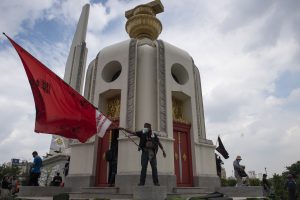BANGKOK — Thailand’s capital saw its fourth large-scale protest in as many months. And like each one preceding it, Wednesday’s anti-government demonstrations brought larger numbers, covered a greater area, and brought with it a more determined opposition. Beginning at 8 a.m. local time the protest disrupted the city as it returned to work following the day marking the death anniversary of the late King Bhumibol on October 13. Tens of thousands began demonstrating early Wednesday morning, gathering at the Democracy Monument before marching toward Government House, the offices of the country’s prime minister.
Numbers may have been impacted due to arrests made the previous day when protest leaders began arriving with tents and equipment, signaling plans for a drawn out demonstration. Some leaders were arrested as authorities moved in to remove protesters and equipment ahead of a royal motorcade passing by the site. Remaining protesters responded by marching to the Royal Thai Police headquarters to demand the release of those detained.
Protests planned for Wednesday began early in an effort to avoid clashes with pro-monarchy demonstrators gathered close by. Despite efforts, violent clashes did occur as tensions rose. Anti-government protesters swarmed the grounds immediately surrounding the Democracy Monument, removing plants that had been placed to keep protesters out. Later in the afternoon the demonstration shifted to a march toward Government House whilst breaching numerous police roadblocks along the way. The longest delay came when the royal motorcade was again due to pass by and authorities used police buses to hide the tens of thousands of protesters from the route’s line of sight.
At the time of writing thousands of protesters were still occupying the roads and paths surrounding Government House in the nation’s capital, despite a newly issued state of emergency declaration by the government banning gatherings of more than four people.
Cory Wright is a photographer/videographer currently based in southeast Asia. His work includes stories relating to conflict, migration, and the wider effects of incarceration and imprisonment. His website is www.coryjwright.com and his Instagram is @coryjwright




















































